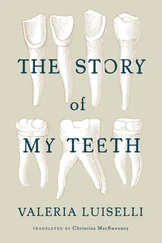The neighbors on his block have rockers and flowers on their porches: probably gardenias, geraniums, petunias. I went up the steps of one of the houses and pissed on some scented geraniums. As I turned to go back down to the street, I walked into a plant pot, which rolled down the steps, spilling its contents. In the darkness, I managed to collect up some of the scattered soil, which I stuffed back as best I could, and, for no other reason than not leaving traces, I took the pot home with me.
I opened the door and greeted the Fucking Yanks. I put my new acquisition on the dining table and pulled up a chair to sit and share the last of the stash of whisky with them. The cats circled, suspicious or curious, I don’t know which, around the new object. When I’d set our four glasses on the table and, blindly, poured a tot into each, I put my hand on the plant pot. I felt around its edges, removed the loose earth with my nails. In the center, a shrub was growing, or a small withered tree — a dead orange tree, judging by the trace of a scent, the texture of the trunk, and the uneven arrangement of the branches. I touched the container, first with my palms and then with my fingertips. I knew almost immediately that it wasn’t just any old plant pot. Running my fingers over the surface, I was able to confirm that it was my pot, the one with green flames, beside which I had penned all the good things I’d written in my younger days. And if it wasn’t my old plant pot, it was exactly the same, and that was enough. I was so excited that I kicked the Fucking Yanks around the room. On a piece of paper I found on top of the refrigerator, I began a letter, as if to a dead friend, or perhaps the preliminary notes for a novel.
I read them again today, in daylight with a magnifying glass. The only thing I can make out is: The novel will be narrated in the first person, by a treea woman with a brown face and dark shadows under her eyes, who has perhaps died. The first line will be these words by Emily Dickinson: “I heard a fly buzz when I died.”
*
It was with Homer that I developed my theory of multiple deaths. Or perhaps I should say that it was he who proposed it, and I just elaborated it at his side.
What happens is that people die many times in a single life, my dear Mr. Owen.
How come, Mr. Collyer?
People die, irresponsibly leave a ghost of themselves hanging around, and then they, the original and the ghost, go on living, each in his own right.
And how can you tell who’s whose ghost?
Sometimes it’s easy. Physical similarities, especially the ears. Have you heard of a young writer, Samuel Beckett, who published a story this year called “Assumption”?
No, never.
And the Viennese philosopher who, a few years back, brought out some crazy stuff about language and logic that he’d written in a trench during the war?
Of course, Ludwig Wittgenstein, he’s really famous: “The world is everything that happens.” But I haven’t read him either.
Well, it’s not important. The other day my brother came home with the newspaper. As he does every day, he read me the society, culture, and politics pages. In politics there was a note about Wittgenstein, and in culture, one on young Beckett. It seemed to me that both notes were talking about the same person. I asked him if there were pictures of the two of them. My brother confirmed my suspicions: the same ears. We turned the affair over for hours and both agreed: of the two, Ludwig is the ghost and Samuel the original.
But isn’t Wittgenstein older?
That’s not important.
Huh?
Damnit, Mr. Owen. Aren’t you the one who can remember the future?
*
The children never come to Philadelphia. Yesterday I sent them a letter saying that Papa was happy and flourishing again, and in the envelope I put a Duchamp-like photo I took of myself, in which I’m hidden behind my plant pot with its armful of dead branches: “I, a fat New Romantic in a tie, standing in front of my eternal, childless, public-servant-papa writing desk on the coastless east coast of this genderless country. Papa’s missing you both here, Gilberto (2nd January 1951).”
*
The first and last appearance of the Ohetivices was, predictably, a failure. Federico and I found ourselves a nice wide passage in the subway. We brought a low stool on which Federico would stand for the duration of the recital. He would declaim in Spanish while I spoke the lines in English, more quietly, at his side. We also brought a Hoover vacuum cleaner, as we had agreed that this was the object on which the wonderfully obscure fragment of That centered. The cue to start would be that Federico pointed to the on button of the Hoover and then:

The outcome was the one thing most capable of hurting Federico: no one even stopped to watch us, despite the Spañolet and I having learned our lines by heart and reciting them with more affectation than an elephant in heat. When I realized that no one was taking any notice of us, I sat on the ground, behind the stool, and started to read — to pretend I was reading — and to savor the letter I would write to Salvador Novo describing the small muscular spasms of the asslet of his adored Andalusian as his whole body and every ounce of charm he possessed strained to attract the attention of the most unmovable race on the planet. Perpendicular people.
Federico had a virtue, or I a defect. Or perhaps it was the other way around. He was not afraid of looking ridiculous. I dreaded it, ended up explaining myself. And there is nothing I abhor more. I get the story all tangled, trip myself up, lose my edge.
That’s the reason why I didn’t say anything to Federico when I saw the woman in the red coat pass us carrying a wooden chair — slender and a little fragile, like her — but I jumped up, as if someone had stuck a rocket up my ass. I abandoned Federico on the spot and followed her through the station toward the exit. But when she got to the stairs, she didn’t go up, didn’t go out into the street. She paused for an instant. I waved, but I don’t think she saw me, because she turned back into the station.
*
How does this thing about remembering the future work? I asked Homer one day while we were stuffing ourselves with chocolate-and-cocaine ice cream.
You’re an idiot, that’s what you are. (The expression he used was moron, but as I didn’t know the word the first time he spoke it, I wasn’t sure if it was a compliment or an insult.)
How come?
You’re a novelist, aren’t you?
I’ve written a couple of lyrical novels, sometimes in the light of, and others in the shadow of, André Gide.
Then you’re a bad novelist, but you are a novelist.
Given.
If you dedicate your life to writing novels, you’re dedicating yourself to folding time.
I think it’s more a matter of freezing time without stopping the movement of things, a bit like when you’re on a train, looking out of the window.
And it’s also not unusual that if you’re a novelist, you’re an idiot.
*
I walked very little in that city where everyone goes for walks. My days went by, bowed over a bureaucrat’s desk, composing reports. But one afternoon, while I was eating my sandwich in the kitchenette, I read a news article that put me in such a good humor that I dropped everything and went out to the street. A young husband was asking the Newark district court judge to grant him a divorce because his fiancée hadn’t told him until the wedding night that, instead of a right leg, she had a wooden prosthesis. He had stolen the false leg as evidence for his hearing, and she’d filed a suit for robbery. The article stopped there. It was a perfect story that begged an ending, which I would perhaps have written that very night if another story hadn’t completely distracted my attention.
Читать дальше












